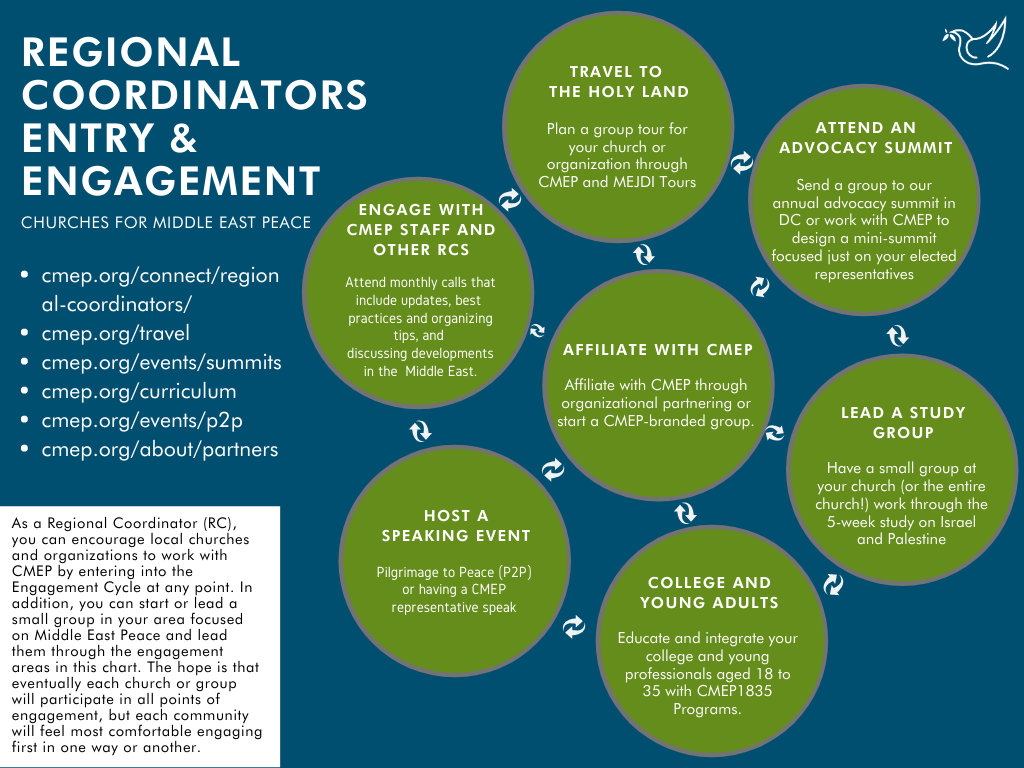Regional Coordinators are vital members of CMEP’s work with essential roles in providing American Christians opportunities to support balanced and pertinent positions for U.S. policymakers that support peace in the Holy Land.
The objective of CMEP’s grassroots advocacy work is to increase the number of messages/reinforcements sent to U.S. policymakers/implementers/influencers in support of Middle East peace from the grassroots community. To do this CMEP recruits and supports local leaders and organizations that recruit and engage Christians concerned about peace with justice in the Holy Land.
Coordinators work with people in distinct geographical areas to coordinate meetings with Senators and/or Congressional Representatives, increase the number of people responding to CMEP’s calls to contact their elected officials or members of the White House administration, raise awareness and education of grassroots network so as to better equip them to be better advocates for peace in the Holy land.
Coordinators are individual activists who are:
- Committed to working for Middle East peace and stay current on developing issues
- Experienced in faith-based social activism and have a personal history of involvement in church-based groups
- In agreement with CMEP’s principles and policy positions, and stay informed about CMEP’s current advocacy efforts (website),
- Articulate a balanced, informed, and empathetic approach to the Israeli-Palestinian conflict through verbal and written communications
- Facilitating and fostering dialogue, whether it is within a congregation, an ecumenical or interfaith gathering, or congressional office, including relating to local Jewish and Arab-American groups engaging in advocacy on the Israeli-Palestinian situation
- Often engaged in multiple activists actions and are publically clear when they are working as a CMEP Coordinator.
Coordinators are committed individuals who will:
- Educate others in CMEP’s federal advocacy and motivate them to respond to CMEP’s calls for action by, among other activities: Providing presentations to local church communities and others interested groups through adult education/forums, mission moments, evening presentations, etc.; Writing articles for congregation or other church newsletters, websites, and other communications
- Conduct local advocacy efforts and outreach to local churches, lay and clergy leaders, and ecumenical and interfaith groups in their own geographic area by: Encouraging people to sign-up for CMEP’s Action Alerts and forwarding Action Alerts to other email lists, including their own; Facilitating/creating opportunities for people to act on CMEP’s Action Alerts, such as encouraging letters to be sent or petitions to be signed after worship services, this includes identify and supporting congregations leaders to make this happen
- Develop and expand networks of relationships with concerned citizens, activists, churches, and other interested groups to increase the audience for CMEP’s Action Alerts and other calls to action by: Providing individual’s contact information (postal address and email address, when known) to CMEP to be contacted; Forwarding CMEP information and Action Alerts to other networks
- Arrange at home meetings with Representatives or Senators in the spring and/or summer.
- Participate in monthly telephone Coordinator meetings to learn the latest on Hill developments, strategize about work in the coming month and share information about local efforts and accomplishments
- Attend CMEP’s Advocacy Conference or send a representative to the conference
Coordinators receive:
- Gracious and deep appreciation from CMEP’s board and staff members
- Access to current information on political developments in Congress affecting Israeli/Palestinian peace through CMEP’s Conference Calls and emails
- Collegial dialogue with other Coordinator through monthly conference calls
- Educational resources provided by CMEP through teleconference meetings with Coordinators, access to CMEP speakers, and online and print materials, and the opportunity to give input and feedback on these resources
- Semi-annual updates of contact information regarding new CMEP members in your geographical area for one-time contact
- Opportunities as an American Christian to participate as a recognized leader in coordinated advocacy for Middle East peacemaking across communions and organizations
- With the support and encouragement of the CMEP staff, enjoy creative opportunities to share your commitment to Middle East peace through developing local events, publications and advocacy efforts, including the ability to have local events publicized by CMEP to CMEP’s supporters

Regional Coordinators
[tmm name=”regional-coordinators”]

